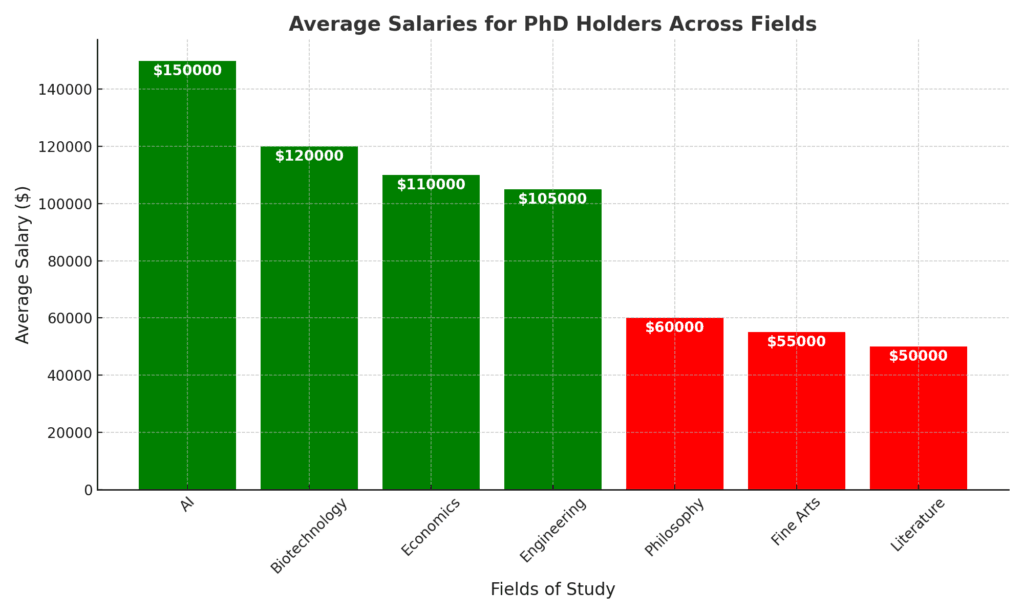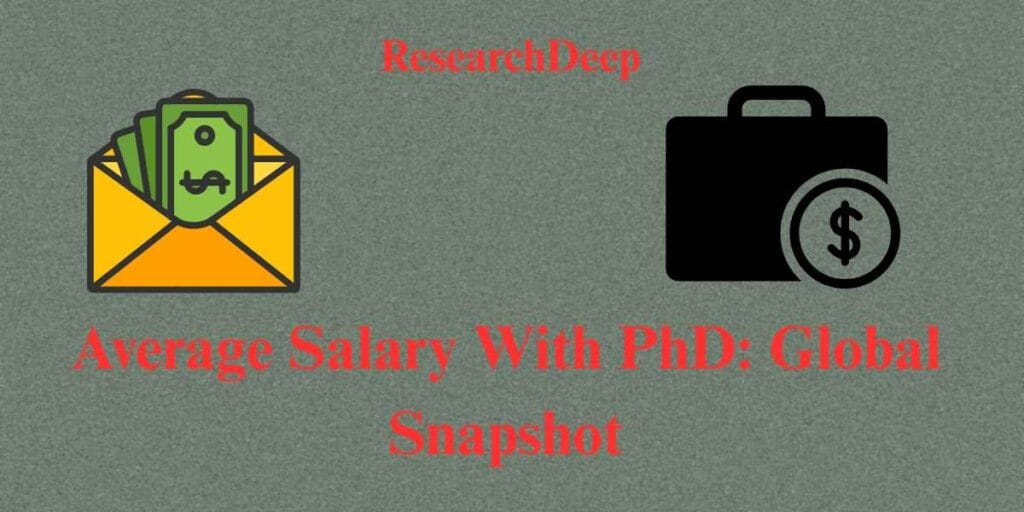Last updated on November 25th, 2025 at 01:23 pm
Before committing to a PhD program, it’s reasonable for students to question: Is getting a PhD worth it?
To better evaluate the worth of a PhD, I have analyzed the two most significant perspectives that stand out: 1] the financial angle and 2] the career enhancement opportunities to help you decide whether a PhD is worth getting or not.
Table of Contents
Financial Perspective: Is Getting a PhD Worth It?
Deciding whether a PhD is worth the financial investment depends on several factors, including your field of study, career aspirations, and funding opportunities.
While a doctorate can lead to higher earning potential in some professions, the costs and opportunity losses during your years of study need careful consideration.
1. Financial Benefits of a PhD
While a PhD represents a significant investment of time and effort, it also offers notable financial benefits in certain fields. Understanding these benefits can help you determine if the degree aligns with your career and financial goals.
1. Higher Earning Potential
A PhD can pave the way for higher-paying careers and growth potential especially in fields where advanced expertise is critical. For instance:
- STEM Fields: In areas like engineering, computer science, and biotechnology, among a few others that are considered the hardest PhDs to get, doctrates often secure roles with salaries that significantly outpace their degree counterparts. These roles may include positions such as data scientists, research directors, and academic professors.
- Business and Economics: PhDs in these disciplines can lead to executive roles, consulting positions, or leadership in policy-making organizations, which often come with lucrative compensation packages.
Example: A PhD in computer science can open doors to AI research roles, where salaries can exceed $150,000 annually, compared to $100,000 for those with a master’s degree.
- Higher Salaries: Certain roles, such as senior researchers, data scientists, or university professors, are accessible only with a PhD.
- Scholarships and Stipends: Many universities provide stipends, tuition waivers, or grants, reducing the direct cost of earning your doctorate.
- Tax Benefits: In some countries, PhD candidates qualify for tax credits on educational expenses.
Table of comparison between Salaries of PhD and Master’s Degree holders
| Field | Average Salary (PhD Holders) | Master’s Degree Holders | Difference |
|---|---|---|---|
| Engineering | $115,000 | $85,000 | +$30,000 |
| Life Sciences | $90,000 | $65,000 | +$25,000 |
| Humanities | $60,000 | $55,000 | +$5,000 |
2. Opportunity Costs
While the financial rewards may seem attractive, it’s important to calculate the opportunity cost—the income you could have earned by working during the years spent pursuing your PhD. For example:
- A full-time professional earning $70,000 per year loses approximately $280,000 over a four-year PhD program.
- Combined with tuition and living expenses, the actual cost of earning a PhD can be substantial.
3. Access to Competitive Roles
Some career paths require a PhD as a baseline qualification, offering access to positions that are otherwise unattainable. Examples include:
- Academia: Tenure-track professorships and senior research positions often require a doctorate.
- R&D Sectors: Roles in cutting-edge research in pharmaceuticals, biotech, or engineering are typically reserved for PhD holders due to the depth of expertise required.
- Policy Development and Think Tanks: Advanced degrees are often a prerequisite for shaping national and international policies.
By meeting these qualification thresholds, PhD holders can command premium salaries and enjoy better job security.
4. Funding Opportunities During the Program
Unlike undergraduate or even master’s programs, many PhD candidates can access funding opportunities to offset costs, these include:
- Stipends: Universities and research institutes often offer monthly stipends to PhD candidates, allowing them to focus on research without the burden of additional employment.
- Tuition Waivers: Many PhD programs waive tuition fees entirely for students who secure research assistantships or teaching roles.
- Grants and Fellowships: External funding bodies, like government agencies and private organizations, provide grants for doctoral research, which can supplement living expenses.
Pro Tip: When choosing a program, compare the funding packages offered by institutions. Fully funded PhD programs can significantly reduce your financial risk.
5. Financial Drawbacks
- Debt Accumulation: In countries like the United States, students often graduate with significant loans.
- Delayed Career Advancement: Entering the workforce later means fewer years to build seniority and retirement savings.
- Variable Job Market: Some fields, like fine arts or humanities, may offer limited high-paying opportunities, making it harder to recover the financial investment.
Average time to complete a PhD [US]
| Field | Average Time To Completion(Years) |
|---|---|
| Humanities and Social Sciences | 5-7 |
| STEM (Science, Technology, Engineering, Math) | 4-6 |
| Education | 3-5 |
6. Networking and Long-Term Financial Growth
A PhD program offers invaluable networking opportunities with leading experts, professors, and peers. These connections can translate into collaborative research, prestigious positions, or entrepreneurial ventures post-graduation.
The professional networks established during a PhD often have a compounding effect on long-term financial growth.
Example: “Alumni from top-tier PhD programs frequently enter influential roles, where mentorship and referrals can significantly boost career trajectories.“
6. Key Takeaways
While the financial benefits of a PhD are more pronounced in fields like technology, healthcare, and engineering, the decision to pursue one should not rely solely on potential income. Evaluate the following:
- Funding Opportunities: Apply for scholarships, fellowships, or assistantships.
- Earning Potential: Research salary trends in your desired field.
- Passion for Research: Remember, the financial return may not justify the effort if you’re not committed to the research process.
Career Perspective: What Opportunities Does a PhD Open Up?
A PhD can significantly influence your career trajectory, opening doors to specialized roles in academia, industry, and beyond to qualify you to land a job in a field that is among the highest-paying PhDs.
While the specific opportunities depend on your field of study, the degree is often associated with advanced positions, higher responsibilities, and unique professional paths.
1. Opportunities in Academia
One of the most traditional routes for PhD graduates is academia, where the degree is often a prerequisite for long-term success.
- Teaching Roles: PhD holders can pursue tenure-track professorships, a coveted and stable position in higher education.
- Research Leadership: Universities often hire PhDs to lead research initiatives, secure grants, and mentor postgraduate students.
- Global Opportunities: Many PhD graduates work as visiting scholars or collaborate on international academic projects.
Challenges: Academic roles, especially tenure-track positions, are highly competitive. In some fields, PhDs may face years of postdoctoral work before securing a permanent role.
While some industries highly value PhDs (e.g., computer science, engineering), others may not require them for specific roles. Consider the specific job market for your chosen field:
2. Opportunities in Industry
Many PhD graduates transition into industry roles, where their expertise is highly valued in solving complex problems.
- Research and Development (R&D): PhD holders are often employed by companies in technology, healthcare, and engineering to spearhead innovation. Examples include developing new pharmaceuticals, advancing AI technologies, or designing sustainable energy solutions.
- Consulting Roles: In fields like economics, finance, and engineering, PhD graduates often work as consultants, advising organizations on strategic decisions.
- Technical Specialists: Positions such as data scientists, machine learning engineers, and biotechnologists often require the specialized training that a PhD provides.
Key Insight: Employers in the industry value the analytical and problem-solving skills that PhD holders bring, making them indispensable in cutting-edge projects.
3. Fields Where a PhD Is Most and Least Worth It
The value of a PhD is closely tied to job market demand and industry expectations:

| High ROI Fields | Low ROI Fields |
|---|---|
| Artificial Intelligence | Fine Arts |
| Biomedical Sciences | Philosophy |
| Buisness and Economics | Literature |
4. Emerging Career Pathways
In addition to traditional academia and industry, PhD graduates are increasingly exploring non-traditional roles that may consider among the best PhD degrees.
- Entrepreneurship: Many PhDs leverage their research to launch startups, particularly in fields like biotechnology, green energy, and artificial intelligence.
- Policy and Advocacy: Organizations, including governments and think tanks, hire PhDs for roles in policy development, particularly in areas like environmental sustainability and healthcare reform.
- Science Communication: PhD holders in physics and biology often work as science journalists or public speakers, making complex ideas accessible to the public.
5. Challenges in career Advancement
Despite the opportunities, PhD holders face several challenges:
- Overqualification: Some employers may perceive PhDs as overqualified for generalist roles, particularly in non-specialized industries.
- Limited Academic Openings: The number of PhD graduates often exceeds the availability of academic positions, leading to intense competition.
- Skill Translation: Transitioning from academia to industry can be challenging if a candidate has not developed transferable skills like project management or teamwork.
6. High ROI Career Fields for PhD Graduates
Certain fields consistently offer high returns for PhD graduates, both in terms of career opportunities and earning potential:
| Field | Career Opportunities | Key Roles |
|---|---|---|
| Artificial Intelligence | R&D, Consulting, Startups | Machine Learning Engineer, Data Scientist |
| Biotechnology | Pharma, Healthcare, Environmental Research | Clinical Researcher, Bioinformatics Specialist |
| Economics | Policy Development, Financial Analysis, Academia | Economist, Policy Advisor, Risk Analyst |
Key Takeaway
While a traditional academic career path may not be the only option, a PhD can still be a valuable asset. Consider:
- Research and Development: Utilize your research expertise in private companies, contributing to innovation and product development.
- Consulting: Leverage your specialized knowledge to advise businesses and organizations.
- Entrepreneurship: Translate your research into a groundbreaking venture.
Making the Most of Your PhD
- Develop Transferable Skills: Broaden your skillset beyond research through workshops, internships, or industry collaborations.
- Network Strategically: Build relationships with professors, researchers, and professionals in your field to explore potential career paths.
So, Is Getting a PhD right for You?
The answer hinges on your goals, interests, and the specific field you’re passionate about. Here are some additional factors to ponder:
- Passion as Your Compass: If driven by intellectual curiosity and a desire to make a significant contribution, a PhD can be an exceptional path.
- Research the Job Market: Thoroughly research career paths and job market demands within your chosen field, both in academia and industry.
Ultimately, the decision to pursue a PhD is deeply personal. Carefully consider your financial situation, long-term goals, and career aspirations.
Explore all possibilities, talk to professionals in your field, and embark on a journey fueled by passion and informed by a realistic understanding of the current landscape if getting a PhD is worth it or not.
FAQs
Is getting a PhD worth it financially?
Financially, a PhD can bFinancially, a PhD can be worth it in high-demand fields like technology, healthcare, and business. However, the opportunity cost of lost income during the study and the debt incurred must be considered.
Does a PhD guarantee a high-paying job?
No, a PhD does not guarantee a high-paying job. Its value depends on the field, job market conditions, and your career goals. Industry roles in tech or biotech often pay well, but academic positions can have modest salaries.
Is a PhD worth it if I want to work in industry?
A PhD is worth it for industry careers in specialized fields such as R&D, data science, and biotech. However, some industries prioritize experience over advanced degrees.
Conclusion
In conclusion, while a PhD offers significant benefits such as deep expertise, advanced research skills, and potential for higher earnings, it also presents challenges in terms of job market competitiveness and financial investment.
The value of a PhD is highly dependent on individual goals, field of study, and personal circumstances. Based on the data and statistics above, make an informed decision if pursuing a PhD aligns with your career aspirations and long-term goals.
But, for a passionate researcher, the question: Is getting a PhD worth it, seldom arises!





Comments are closed.